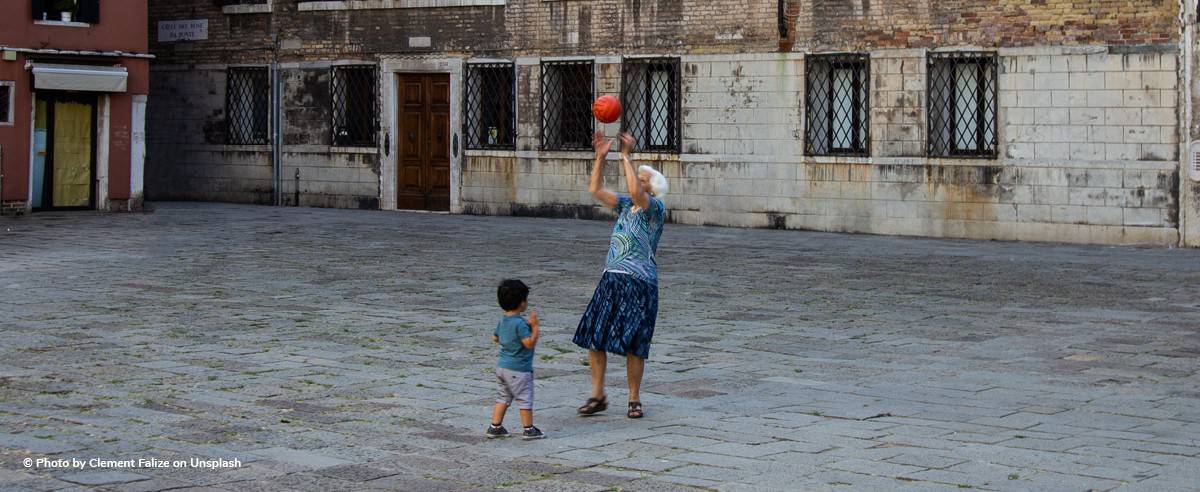Our societies have reached their tipping point. Demographic change, growing inequalities, the climate crisis, COVID-19, and the impacts of the war in Ukraine are all having a negative impact on the health and well-being of our societies. EuroHealthNet’s Annual Seminar “Growing Strong in times of crisis – Investing in wellbeing and health equity for young and old” gathered public health experts and policymakers to discuss these matters.
Gabriella Sutton, Policy and Practice Officer and Alison Maassen, Programme Manager at EuroHealthNet elaborate on the importance of investing in the fundamental conditions for good health and provide an overview of the key messages from the Annual Seminar which took place in Brussels in May 2022. Make sure to have a look at the Seminar report as well.
Shifting the focus to health and wellbeing
As crucial stages in the life-course, people in the early years and later years of life are particularly susceptible to the negative impacts of multiple crises. How we approach health and wellbeing during these phases has direct consequences on the long-term resilience of our health systems and our wider societies. We must prioritise health equity and wellbeing among children, youth, families, and older people to ensure they have the essential conditions and resources to thrive, setting them up for lifelong health and wellbeing. While the political focus and financial resources are being diverted to react to current crises, public health professionals can play an important part in advocating and catalysing a more proactive and paradigmatic shift which prioritises investments in the fundamental conditions and determinants of health and wellbeing. How can this be done?
EuroHealthNet’s Annual Seminar “Growing Strong in times of crisis – Investing in wellbeing and health equity for young and old” gathered public health experts and policymakers to discuss the prioritisation of public investments in health equity and wellbeing in childhood, adolescence and in older groups, against the backdrop of multiple crises. The spectrum of speaker interventions effectively drew on key research findings, EU policy developments and promising approaches which could help safeguard the basic conditions for good health, including peace, education, a stable and sustainable ecosystem, social justice, and equity.[1]


Cultivating a healthy school environment
Within the focus on younger groups, schools were highlighted as the key setting to establish the foundations for healthy lives, and to enable a positive spill-over effect within wider communities[2].
In fact, well-designed “health-promoting school” programmes contribute to reduced inequalities and are additionally cost-effective with a high return on investment. Research has shown that the return of investment (through the avoidance of direct healthcare costs related to the treatment and management of chronic diseases) would be 824% for comprehensive health programmes, 465% for multicomponent interventions, and 484% for PE curriculum[3].
Such figures contextualise the importance of investing in integrated approaches to health promotion within school settings. They also outline the essential role public health professionals can play in translating their expertise within school settings and positioning themselves better as “catalysts for structural change”, breaking through siloed approaches to promote good health outcomes.[2]

An investment-focused approach to public health and wellbeing, supported by demonstrated economic returns of investment, can generate greater momentum to advocate longer-term solutions to current challenges.
The economic benefits of healthy and active ageing
Shifting the discussion to older groups, the seminar also broke down common (mis)perceptions about the ageing population. Europe’s rapidly ageing population presents uncertainties on multiple fronts, including the sustainability of public finances and the availability of social services and long-term care. However, findings[4] shatter the perception that population ageing will automatically result in slowed down economic growth, lower tax revenues and increased health expenditures. Conversely, they show that the influencing factor on economic growth is not the size of the older workforce, but the state of their health. This indicates that a healthy older labour force is not associated with slower economic growth, but predictions demonstrate that exact opposite.

From a health expenditure point of view, literature has demonstrated that older people do cost more on average, but ageing will not drive health spending by itself[5]. Health spending is only slowly increasing and is mainly impacted by end-of-life costs at older ages[6], which can be moderated through effective policies which promote healthy and active ageing.
Positively, there is significant traction on healthy and active ageing at EU and international level, with tools such as the European Care Strategy[7], the European Pillar of Social Rights[8], the Active Ageing Index[9], the Madrid International Plan of Action[10] to tackle ageing and the European Innovation Partnership on Active and Healthy Ageing[11], all demonstrating commitment to this shift. Yet gaps remain in the levels of implementation across countries, as investments in age-friendly and health-promoting environments within our complex societal structures require integrated and co-creative approaches with older groups.
The seminar included valuable insights about how this is being achieved ‘from the ground’ in Andalusia (Spain), Wales, and Northern and Baltic countries. As health promotion becomes more recognised for its role in ensuring resilient health and social systems, public health professionals are increasingly central in mobilising a collective and cross-sectorial rethink of policies and services, redirecting attention to the need for investments which place health and equity at the core.


A time for change
As demonstrated by the negative impacts of the multiple crises we have faced, traditional ways of doing things may no longer be viable.
To build resilience among societies, investments should revamp structures and approaches, embodying alternative economic and care models, such as the Economy of Wellbeing.
Achieving a Wellbeing Economy – where people’s wellbeing and economic development are interdependent and more mutually-reinforcing – is a key vision looking forward.[12] A vision already expressed by EU Member States in their 2019 Council conclusions[13] as well as by the WHO in its recent Geneva Charter for Wellbeing launched during the 10th Global Conference on Health Promotion.[14]
An investment-focused approach to public health and wellbeing, supported by demonstrated economic returns of investment, can generate greater momentum to advocate longer-term solutions to current challenges. Public health professionals, as experts in the value of health promotion and equity-based interventions, therefore, play a critical role in pushing for investments of this nature.
To do this, speakers reiterated that it is time the public health field collaboratively embarks on a path with other social sectors, to increase their financial literacy and understanding. This could be the first step to investing in public health capacities from within, to ensure that professionals in the field can make a strong case for health-promoting investments which capture the essence of an Economy of Wellbeing beyond the four walls of their respective entities.
Economy of Wellbeing
Watch and share EuroHealthNet's short clip on the Economy of Wellbeing - fostering a transition towards healthier, more inclusive, and sustainable societies.
Acknowledgements
With special thanks to the seminar speakers and moderators, whose insightful and thought-provoking interventions contributed to fruitful discussions - Dr Mojca Gabrijelčič Blenkuš (National Institute of Public Health in Slovenia), Lorna Renwick (Public Health Scotland), Mr Toma Šutić (Cabinet for the Vice-President for Democracy and Demography, European Commission), Professor Terje Andreas Eikemo (Centre for Global Health Inequalities Research), Ms Jana Hainsworth (Eurochild), Prof Didier Jourdan (UNESCO Chair on Global Health and Education), Dr Ana Carriazo (Andalusian Regional Ministry of Health and Families), Ms Vicky Jones (Adverse Childhood Experiences Support Hub, Public Health Wales), Ms Gemma Williams (European Observatory on Health Systems and Policies London Hub), Ms Susanna Ulinski (DG EMPL, European Commission), Dr. Ülla-Karin Nurm (Northern Dimension Partnership in Public Health and Social Well-being), Mr Klaus Niederlander (Ambient Assisted Living Association), Prof Silvio Brusaferro (Istituto Superiore di Sanità), Ms Tatjana Buzeti (WHO European Office for Investment for Health and Development), Ms Marianne Takki (DG SANTE, European Commission).


